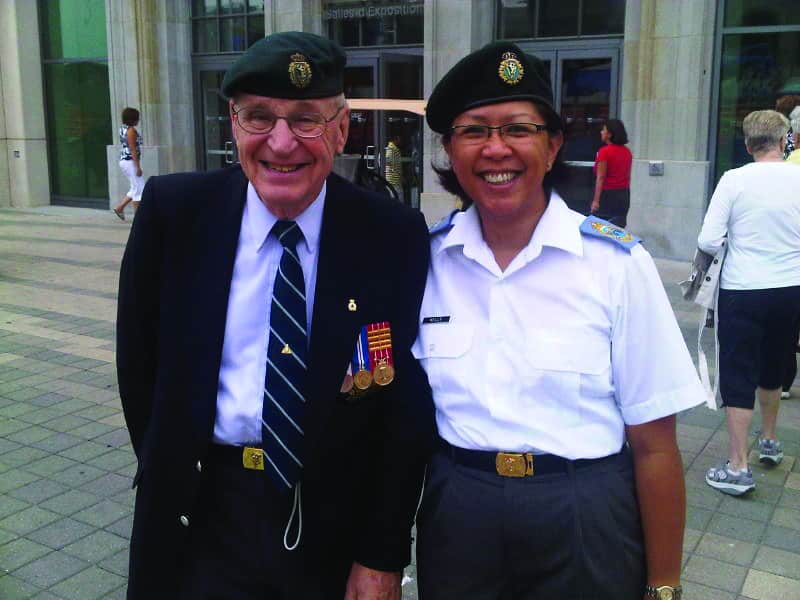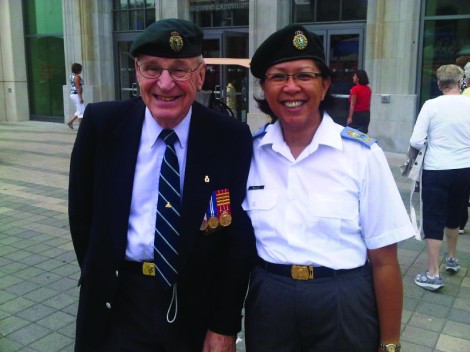
Knopf at 2013 Rememberance Day ceremony. PHOTOS COURTESY OF GHERARD KNOPF
Lieutenant-Colonel Gherard Knopf
Lieutenant- Colonel Gherard Knopf was a member of the 8th Signal Regiment and experienced the hardships of Nazi Germany first-hand. He came to Canada from Germany in 1951 to finish the last two years of his electrical engineering degree at the University of Toronto. Once completing his degree he joined the Reserves in 1957, and served for 52 years before officially retiring. Currently, Knopf is an active member of the Royal Canadian Legion and the university’s Soldiers Tower Committee.
The Varsity: Why did you join the military?
Gherard Knopf: My dad was in the army during WWI. He was in the cavalry and served in the Eastern Front against Russia. So I chose to be in the military, in part, because of him.
I graduated in 1957 with a degree in electrical engineering. I knew a lot of buddies that were going into the military, so I became interested. I looked at three different units that had something to do with engineering. Somehow I chose [the 8th Signals Battalion], even though I was studying high-power stuff and Signals was low-power.
TV: Are there any misconceptions that people have about military life?
GK: Well, people didn’t really acknowledge PTSD [post-traumatic stress disorder] back then. It was something that came out of more recent exchanges, so it’s more recognized now than it was then. People used to think it’s just physical injuries, but it’s more than that.
I know people who went to Hong Kong and were imprisoned by the Japanese. You hear them, how they have bad dreams at night. And in Afghanistan now, you have some people who are also badly injured.
But you get these situations where veterans are required to go through all these motions just to get help. The government needs to be more aware of their problems.
Right now, there’s a lot of pressure put on Veteran Affairs to give veterans proper help. Because some people lost their lives or return injured. So there’s that, too. The government is being hard on recent veterans. They think they can handle it, but they need this sort of help. We need to make sure the government does not cut things off for the vets.
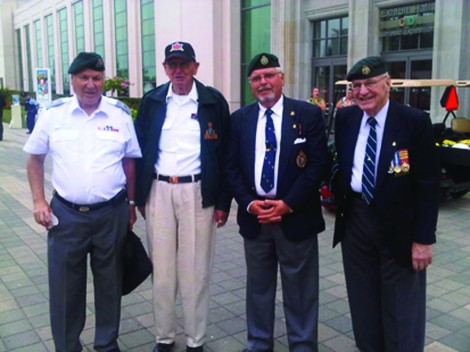
Liutenant-Colonel Gherard Knopf (far right) joined the reserves in 1957. PHOTO COURTESY OF GHERARD KNOPF
TV: What does Remembrance Day mean to you?
GK: You have to try to acknowledge what people did in the past, whether they were killed or whether they survived. And some people had some pretty rough times, even after they survived.
It’s also a good way to support veterans through donations, which is also important.
TV: Do you think students adequately commemorate Remembrance Day?
GK: It could be better. We tried, in earlier years, to have classes suspended for the two minutes of silence, but we faced some problems with that. Last year’s attendance was around 1,500, but this year’s was closer to 1,250.
But it’s still a good turnout. We used to get distinguished people and their families, and they attracted people. But people die, and we have to cope.
We also have a lot of international students from all over the world coming — a lot of, say, Chinese students in the area who are interested in Canada’s history. And I think that’s a good thing. It shows people still care about their sacrifices.
TV: Do students treat recent veterans differently from older veterans?
GK: I think it really depends on the student’s views and experiences. Usually he had some parents who were in the forces or grandparents from WWI. They usually relate that way, by having a family member be involved in a war.
Sometimes, students are just able to see what was done to keep our lives here, away from the tragedies that happened. And you see that all the time when students visit the Soldier’s Tower. The respect that they have is for all soldiers.
TV: How were recent veterans treated when you were a student?
GK: I think it was the same, actually. The difference is that many students knew a lot of people who were affected by the war. Again, it’s easier to relate if your family is affected.
You have different opinions, of course. And you have to respect that, too.
Well, as long as they support things in the end. One person I knew was a pacifist. He didn’t want to wear weapons, but he was able to do good for people by helping them survive medically in China.
So, even back then, it still depends on the student’s views.
— Jerico Espinas
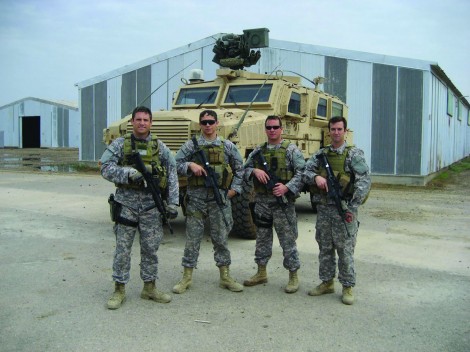
Staff Sergeant Craig Maniscalco (second from left) joined the US military in 2005. PHOTO COURTESY CRAIG MANISCALCO
Staff Sergeant Craig Maniscalco
Staff Sergeant Craig Maniscalco served for five years as a Special Forces Engineer in the United States Army, deployed in Iraq, the Philippines, and Nepal. Now he is a student at the University of Toronto, studying english and philosophy. In addition to his studies he is vice-president, administration at New College, and was co-head of the New College frosh week in 2013.
The Varsity: How do people at U of T react to you having been in the American military?
Craig Maniscalco: In the United States, it is uncommon to meet a person who has no connection to the military. In Canada, they are sort of segregated, not in culture, but in distance, space. So typically the reaction is just surprise, awe. “That’s cool.” “What’s that like?” It’s just a lack of awareness; it’s like meeting someone who has three eyes.
TV: Why did you join the military?
CM: It’s a legitimate option in the states, it’s a legitimate career option. There is a sense of duty and service involved. Personal philosophy would be the best short answer for why I joined the military.
TV: Do people ever respond negatively to you when they find out you were in the military?
CM: I’ve had several people who are very confrontational, but it’s more academically confrontational. Like in the states, someone who dislikes you and dislikes the military will call you a “baby killer,” but in Canada somebody will ask, “Morally, what do you think gives America the right to interfere in other countries’ internal affairs?” That’s a legitimate question; alright, let’s talk.
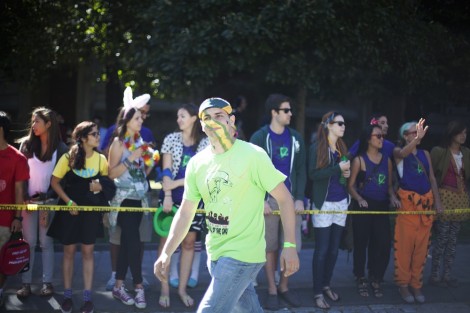
Maniscalco all decked out for Innis College orientation week. PHOTO COURTESY CRAIG MANISCALCO
TV: Are there any sorts of misconceptions that people have about what it’s like to be in the military?
CM: There’s a misconception that being in the military is necessarily incredibly hard or incredibly life-changing when that just isn’t the case. Being in the military is like being in a job. Three per cent of my job is what people would think of when they think of what the military is.
We didn’t have any casualties in Iraq, but we had several in the Philippines. There’s a misconception there, “Oh there was actual fighting in the Philippines?”
People died. So, that was hard. That was a hard deployment. My best friend at the time was in Afghanistan. He died while I was in the Philippines. It was very hard.
TV: What does Remembrance Day mean to you?
CM: While for all veterans, Remembrance Day will make them think of their time, their friends, and the veterans that they know, but I think it almost always also is a chance to think about how much the people who came before us did for us.
TV: Do you feel that your student life and your past military life intersect?
CM: Not really. I think being a veteran in many ways makes student life very difficult. It makes it much more difficult to connect with people. You don’t have a shared experience with people right off the bat.
TV: Do you think that’s any different then for any other mature student?
CM: I would say that’s probably a regular mature student problem. Except for the fact that university students love to argue about politics, love to debate. It’s hard not to get sucked into that. Many, many times I have had an opportunity to participate in a debate where my experience will have put me on an extreme end of the spectrum.
TV: Do you wish you had seen more combat?
CM: The bottom line is that no soldier wants to go to war. No soldier wants to be fired at, or shoot people, but it’s a job and a calling that we all feel very strongly about. It saddens me quite a bit to know that my team went to Afghanistan without me a few months after I left. Knowing what I know now, I would have a very hard time leaving when I did. You develop a family. Essentially, my family was in a place of grave danger without me. That’s hard.
TV: What was the best thing about being in the military?
CM: My sense of self is very different now than it was, or would have been, had I not been in the military. My understanding of what I am, what I can be, what I am capable of. Those are thing that I can never lose and I can’t give back. Plus, they paid for college.
The interviews have been edited for length and clarity.
— India McAllister

